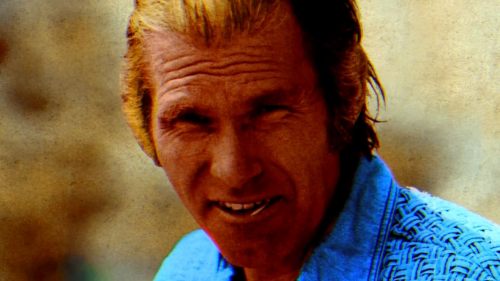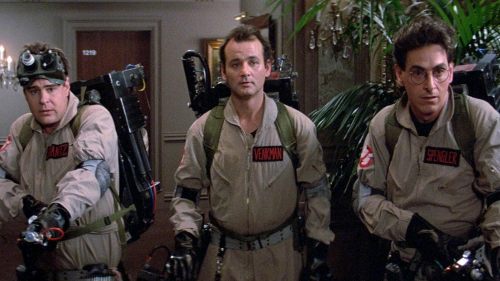Collins’ Crypt: Fewer Franchises, More Metaphors!
If "Drawn & Quartered" was a look at ALL of the box office stats from the previous four months, as opposed to just the genre films, then the next installment would be pretty grim. Unless you're John Wick or were released by Disney, this summer has seen one film after another come in below expectations and, in many cases, flop hard to boot. King of the Monsters, Men in Black International, Dark Phoenix... the films all keep ending up at the bottom of their respective franchises' charts, and there is seemingly no rhyme or reason for it. John Wick 3 and Toy Story 4 have both done just fine (power of Keanu?), and of course Endgame is one of the biggest movies of all time - but those exceptions used to be the rule, especially for the summer season. But now it's clear the big guns can't rely on their proven brands; I can't imagine how poorly a new Transformers or Pirates movie (i.e. franchises that succeed primarily on the strength of being released when we would enjoy a couple hours of ice-cold air conditioning) would perform if they were part of this crowd.
And alas, this has stretched to horror, as well: the Child's Play remake crashed and burned even with some unexpected raves from the horror sites who were initially dismayed at the film's existence (as its creative team did not include series' godfather Don Mancini), and then a few days later Annabelle Comes Home, despite a number of "best of the series" reactions (including my own), opened well under par for the Conjuring-verse franchise. Perhaps it's just the very crowded "a toy that's alive" marketplace spreading the audience too thin, but I am pretty sure their under average grosses are yet more evidence that moviegoers are getting less excited about roman numerals and ": (subtitle)" on the marquees. And it's not just the summer stuff; Happy Death Day 2U also disappointed earlier in the year, and news of a new Paranormal Activity in the works was met with a resounding shrug, so I can't imagine that one will restore the series to its former box office glory.
But here's the thing: despite their prominence, horror can easily survive a world where people no longer wish to fork over their hard-earned money for stories they've seen before. The studios like to rely on their proven big money properties, but the problem with those is that they tend to be expensive to make, as well, and only Disney has the deep pockets to make the occasional flop not even matter (after Godzilla 2, Lego 2, and Shaft all losing money, I wouldn't want to be working at Warners right now). If audiences keep shrugging their shoulders at the known commodities, the majors will be "forced" to start pumping out more originals - and an original tentpole is about as hard to find as a big crowd for a Dark Phoenix screening right now. Unless it stars Dwayne Johnson (Skyscraper and San Andreas being among the select few $100m+ budgeted films in the past five years to come along that were not based on an existing property), they just don't risk it anymore, and they'd seemingly rather cut costs by changing out the stars (i.e. Men in Black) while keeping their beloved IPs alive than attempt to launch new ones.

That's where horror comes in. While the big sequels keep flopping, you know who's feeling just fine right now? Blumhouse and Universal, whose partnership has minimal risk and yields big profits just about every single time. Maybe a "summer movie" grossing less than $60m worldwide looks bad, but when that movie is Ma and it only cost about $5m, suddenly things look pretty damn good. Indeed, the only (ONLY!) original movie in the year's top twenty grossers so far is Universal's Us (produced by Jason Blum but curiously not marketed with the Blumhouse name), a horror film made for a fraction of the cost of every other film on that chart. Detective Pikachu, Dumbo, Pets 2... all of these "easy money" releases won't manage to (domestically) outgross a $20m R rated horror movie that pays homage to C.H.U.D., of all things.
The success of Us, as well as Peele's earlier Get Out, is perhaps at least partly due to the current state of the world, particularly the United States. I don't like to get political and I won't use this space to point any fingers or soapbox, but I think we can all agree that folks are a bit "heated" these days compared to, say, 2015, and interested in seeing how smart filmmakers draw from that to tell their stories. And because of that, I think there's a goldmine waiting to be tapped, and not just by Jordan Peele. Horror has historically benefited from times of social unrest - George Romero made a career out commenting on how f'ed up things were in this or that period, in fact - and writers a lot smarter than me have been able to draw parallels between real world issues and horror trends for almost as long as the horror film has existed. Surely, there are one or two things in the news these days that can serve as a springboard for the *next* Us or Get Out?
See, there's a nice bonus to those particular horror movies: more often than not they can still work even if you ignore - or just completely miss - the social or political allegories contained within. As a (white) teenager living in suburban Massachusetts, I must admit that I was unaware of what the still images at the end of Night of the Living Dead were actually invoking - 14 year old me just thought it was an interesting way to end a "cool zombie movie". Ditto Candyman or People Under the Stairs - they'd be nearing their ten year anniversaries before I ever realized they had something to say and that their success wasn't exclusively due to the Clive Barker or Wes Craven names attached to them. Sure, there are horror films that are more upfront about their politically-charged content, such as Undocumented, a found footage movie from 2010 (!) where some radical (read: racist and unhinged) men detain a group of would-be illegal immigrants and torture them - there is no question what the filmmakers were "getting at" as there was no disguise. While it's depressing the film may be more relevant now than it was nearly a decade ago, it's important to note that more often than not, genre filmmakers can draw from these atrocities without being so direct, so that the film can still appeal to a mass audience that may be turned off by the same topic if it was clearly stated.

Now, this is most certainly not the exclusive right of horror - any genre can do the same thing with any issue it sees fit. But the cost of most non-horror movies makes it too risky an endeavor, so their producers find it best not to invite any controversy. When a Rogue One screenwriter made a comparison between the series' villainous Empire and a guy whose name rhymes with "lump", some people were outraged that political messaging would find its way into their beloved space movie, forcing Disney head Bob Iger to comment on it, assuring fans that there wasn't anything of the sort in the film. Why? Because Rogue One cost $265m and was a risky attempt at finally expanding the Star Wars universe beyond the Skywalker family, and needed every potential dollar it could make. Now let's say similar rumors sprung up around, I dunno, Brightburn - I highly doubt the head of Screen Gems would worry all that much about it, seeing as the film cost $6m and had minimal franchise potential. Hell, he might even encourage such chatter, if only to earn some free marketing.
When you add all that up, if anything it's downright baffling we aren't glutted with forward-thinking horror films, when you consider the low-cost and massive potential they have. You would think the two years in between Get Out and Us, factoring in both the former's success and the increasingly volatile world we live in, would have yielded at least a dozen genre films cut from similar cloth being given the same push Universal gave to Peele's films, but nope! Apart from the most recent Purge movie, which was more overtly political than its three predecessors (two of which were, I should note, pre-2016) and was ALSO Universal/Blumhouse, no major studio seems to want to join the fray. Sure, we can always count on the genre to tackle things like religion and mental health while benefiting from the "anything goes" creative freedom the genre provides, but where's the angry stuff I thought we'd be overloaded with by now? Why are there more shark movies coming out this year than anything that would make George Romero proud? Do we really need to rely on the Purge series for this sort of thing?
I'm not saying there's anything wrong with horror movies with nothing beneath the surface - obviously, as an avowed slasher aficionado, I'd be a damn hypocrite to suggest anything of the sort. But when this genre and this genre alone has the freedom to say something without its backers incurring heavy financial risk by pissing off this or that group, it seems wasteful that we're not seeing it more often. The independent circuit will always provide - there was a long awaited sequel to Tales From The Hood last year, for example (there's also THIS, and yes, it's a full length movie), but I can't help but feel the studios are blowing their chance to make socially relevant horror at a time when they would likely be fully embraced. I know it's appealing to draw from the past (this year's biggest horror hit after Us, La Llorona, takes place in the 1970s, as does Annabelle 3), but as audiences aren't interested, then it's time to start mining the present for our fright fare. Even if they are cynically greenlit as trying to follow in Peele's footsteps, smart filmmakers can make them just as worth our while.



